AMD Zen 3 Ryzen Deep Dive Review: 5950X, 5900X, 5800X and 5600X Tested
by Dr. Ian Cutress on November 5, 2020 9:01 AM ESTCPU Tests: Legacy and Web
In order to gather data to compare with older benchmarks, we are still keeping a number of tests under our ‘legacy’ section. This includes all the former major versions of CineBench (R15, R11.5, R10) as well as x264 HD 3.0 and the first very naïve version of 3DPM v2.1. We won’t be transferring the data over from the old testing into Bench, otherwise it would be populated with 200 CPUs with only one data point, so it will fill up as we test more CPUs like the others.
The other section here is our web tests.
Web Tests: Kraken, Octane, and Speedometer
Benchmarking using web tools is always a bit difficult. Browsers change almost daily, and the way the web is used changes even quicker. While there is some scope for advanced computational based benchmarks, most users care about responsiveness, which requires a strong back-end to work quickly to provide on the front-end. The benchmarks we chose for our web tests are essentially industry standards – at least once upon a time.
It should be noted that for each test, the browser is closed and re-opened a new with a fresh cache. We use a fixed Chromium version for our tests with the update capabilities removed to ensure consistency.
Mozilla Kraken 1.1
Kraken is a 2010 benchmark from Mozilla and does a series of JavaScript tests. These tests are a little more involved than previous tests, looking at artificial intelligence, audio manipulation, image manipulation, json parsing, and cryptographic functions. The benchmark starts with an initial download of data for the audio and imaging, and then runs through 10 times giving a timed result.
We loop through the 10-run test four times (so that’s a total of 40 runs), and average the four end-results. The result is given as time to complete the test, and we’re reaching a slow asymptotic limit with regards the highest IPC processors.
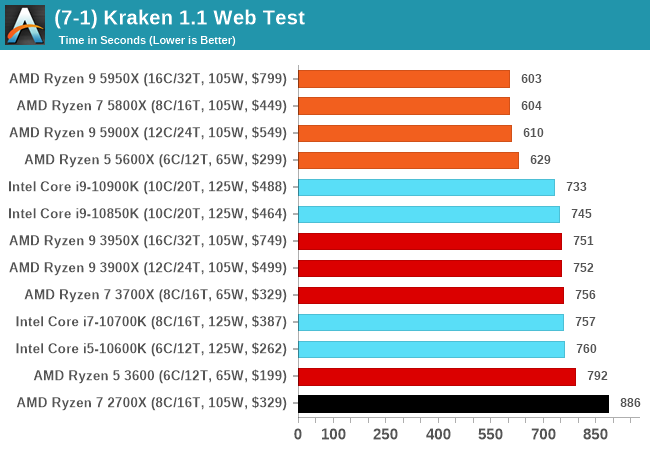
Google Octane 2.0
Our second test is also JavaScript based, but uses a lot more variation of newer JS techniques, such as object-oriented programming, kernel simulation, object creation/destruction, garbage collection, array manipulations, compiler latency and code execution.
Octane was developed after the discontinuation of other tests, with the goal of being more web-like than previous tests. It has been a popular benchmark, making it an obvious target for optimizations in the JavaScript engines. Ultimately it was retired in early 2017 due to this, although it is still widely used as a tool to determine general CPU performance in a number of web tasks.
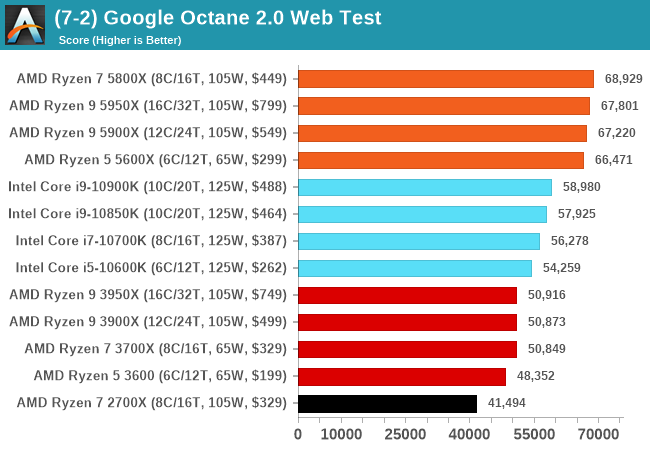
Speedometer 2: JavaScript Frameworks
Our newest web test is Speedometer 2, which is a test over a series of JavaScript frameworks to do three simple things: built a list, enable each item in the list, and remove the list. All the frameworks implement the same visual cues, but obviously apply them from different coding angles.
Our test goes through the list of frameworks, and produces a final score indicative of ‘rpm’, one of the benchmarks internal metrics.
We repeat over the benchmark for a dozen loops, taking the average of the last five.
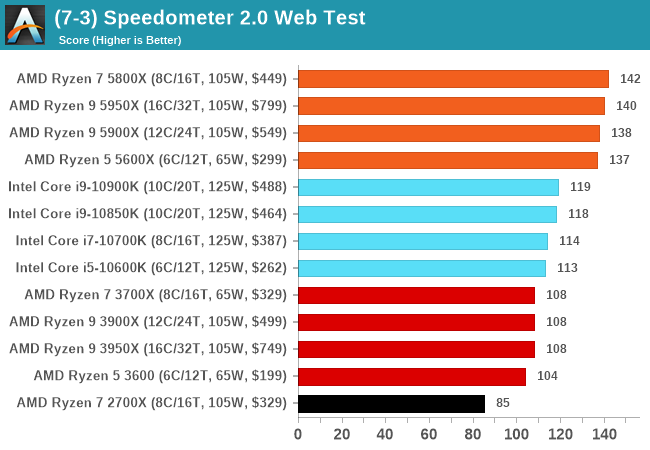
Legacy Tests
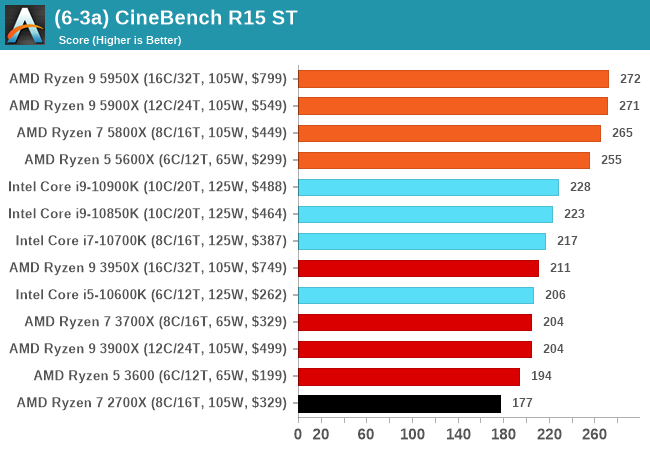
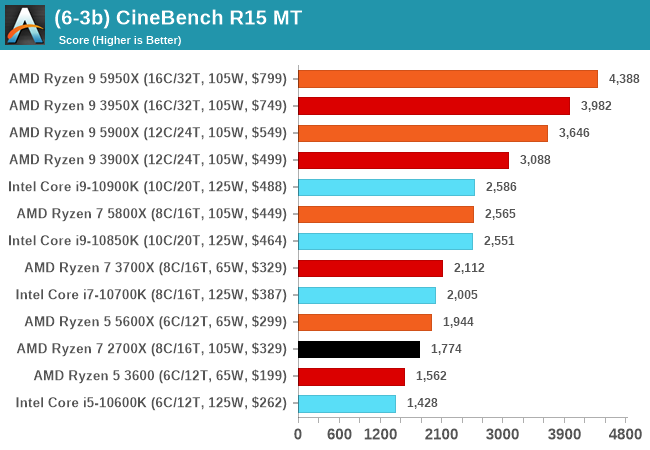
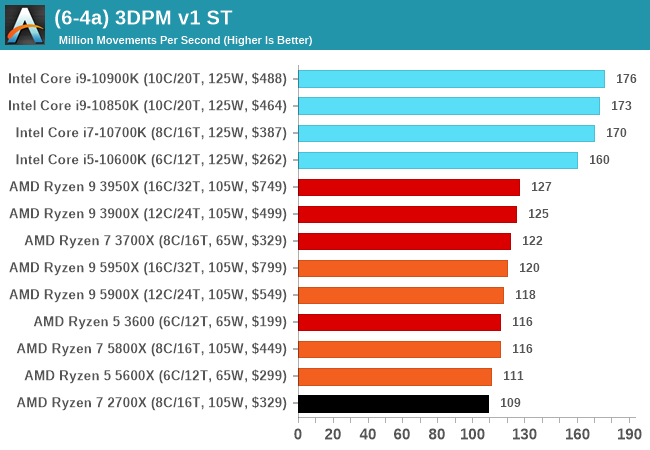
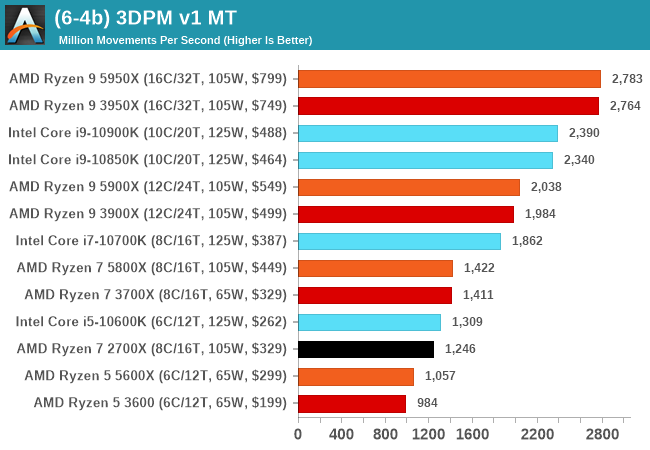


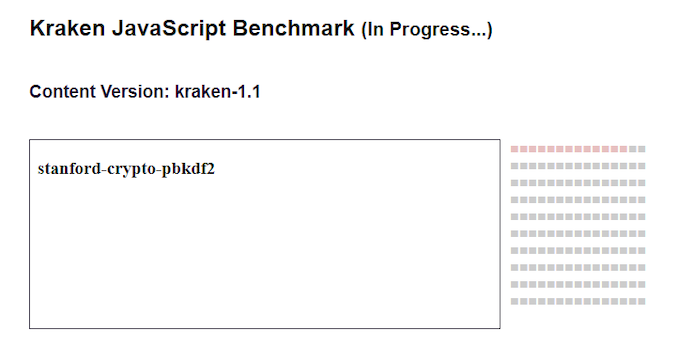
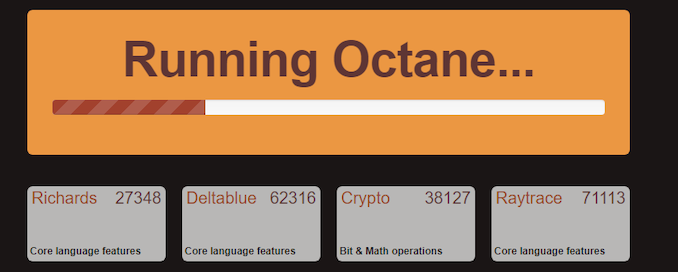
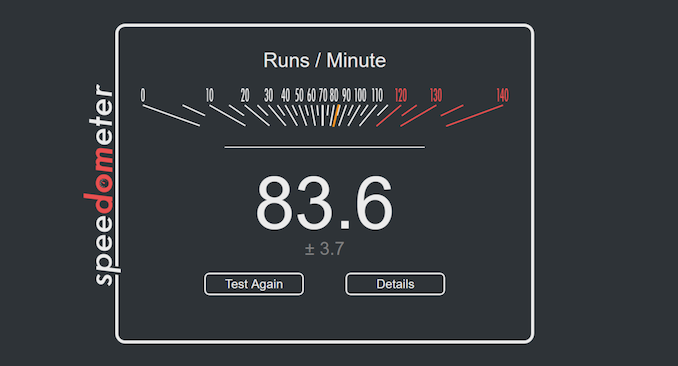








339 Comments
View All Comments
jakky567 - Tuesday, November 24, 2020 - link
Total system, I think the 5950x should be more popular. That being said, the 5900x is still great.mdriftmeyer - Monday, November 9, 2020 - link
I spend $100 or more per week on extra necessities from Costco. Your price hike concerns are laughable.bananaforscale - Monday, November 9, 2020 - link
5900X has good binning and the cheapest price per core. For productivity 3900X has *nothing* on 5900X for the 10% price difference and 5950X is disproportionately more expensive. Zen and Zen+ are not an option if you want high IPC, 3300X basically doesn't exist... I'll give you that 3600 makes more sense to most people than 5600X, it's not that much faster.Kangal - Wednesday, November 11, 2020 - link
"Price per Core".... yeah, that's a pointless metric.What you need to focus on is "Price per Performance", and this should be divided into two segments: Gaming Performance, Productivity Performance. You shouldn't be running productivity tools whilst gaming for plenty of reasons (game crashes, tool errors, attention span, etc etc). The best use case for a "mixed/hybrid" would be Twitch Gaming, that's still a niche case.... but that's where the 5800X and 5900X makes sense.
Now, I don't know what productivity programs you would use, nor would I know which games you would play, or if you plan on becoming a twitcher. So for your personal needs, you would have to figure that out yourself. Things like memory configurations and storage can have big impacts on productivity. Whereas for Gaming the biggest factor is which GPU you use.
What I'm grasping at is the differences should/will decrease for most real-world scenarios, as there is something known as GPU scaling and being limited or having bottlenecks. For instance, RTX 2070-Super owners would target 1440p, and not 1080p. Or RTX 3090 owners would target 4K, and not for 1440p. And GTX 1650 owners would target 1080p, they wouldn't strive for 4K or 1440p.
For instance, if you combine a 5600X with a Ultra-1440p-card, and compare the performance to a 3600X, the differences will diminish significantly. And at Ultra/4K both would be entirely GPU limited, so no difference. So if you compare a 5800X to a 3900X, the 3900X would come cheaper/same price but offer notably better productivity performance. And when it comes to gaming they would be equal/very similar when you're (most likely) GPU limited. That scenario applies to most consumers. However, there are outliers or niche people, who want to use a RTX 3090 to run CS GO at 1080p-Low Settings so they can get the maximum frames possible. This article alludes to what I have mentioned. But for more details, I would recommend people watch HardwareUnboxed video from YouTube, and see Steve's tests and hear his conclusions.
Whereas here is my recommendation for the smart buyer, do not buy the 5600X or 5800X or 5900X. Wait a couple months and buy then. For Pure Gaming, get the r5-5600 which should have similar gaming performance but come in at around USD $220. For Productivity, get the r7-5700 which should have similar performance to the 5800X but come in at around USD $360. For the absolute best performance, buy the r9-5950x now don't wait. And what about Twitch Streamers? Well, if you're serious then build one Gaming PC, and a second Streaming PC, as this would allow your game to run fast, and your stream to flow fluidly.... IF YOU HAVE A GOOD INTERNET CONNECTION (Latency, Upload, Download).
lwatcdr - Monday, November 9, 2020 - link
"You can get the 3700 for much cheaper than the 5800X. Or for the same price you can get the 3900X instead."And if you want both gaming and productivity? They get the 5800X or 5900X. So AMD has something for every segment which is great.
TheinsanegamerN - Thursday, November 12, 2020 - link
The 5900x is margin of error from the 5950x in games, still shows a small uptick in gaming compared to 5800/5600x, offers far better performance then 5600/5800x in productivity tasks, and is noticeably cheaper then the 5950x.How on earth is that a non buy?
The rest may be better value for money, but by that metric a $2 pentium D 945 is still far better value for money depending on the task. The 5000 series consistently outperforms the 3000 series, offring 20% better performance for 10% better cash.
Kishoreshack - Saturday, November 14, 2020 - link
AMD has the best products to offerSoo you expect them to sell it at a cheaper rate than intel ?
Threska - Monday, November 16, 2020 - link
AMD has a good product RANGE, which means something for everyone AND all monies go to AMD regardless of consumer choice.Ninjawithagun - Friday, November 20, 2020 - link
The price hike is mainly to cover ongoing R&D for the next-gen Ryzen Zen 4 CPUs due out in 2022. The race between Intel and AMD must go on!jakky567 - Monday, November 23, 2020 - link
I disagree about the 5900x being a no buy.I feel like it goes 5950x for absolute performance. 5900x for high tier performance on a budget. And then the 3000 series for people on a budget, except the 3950x.
The 5900x has all the l3 cache.